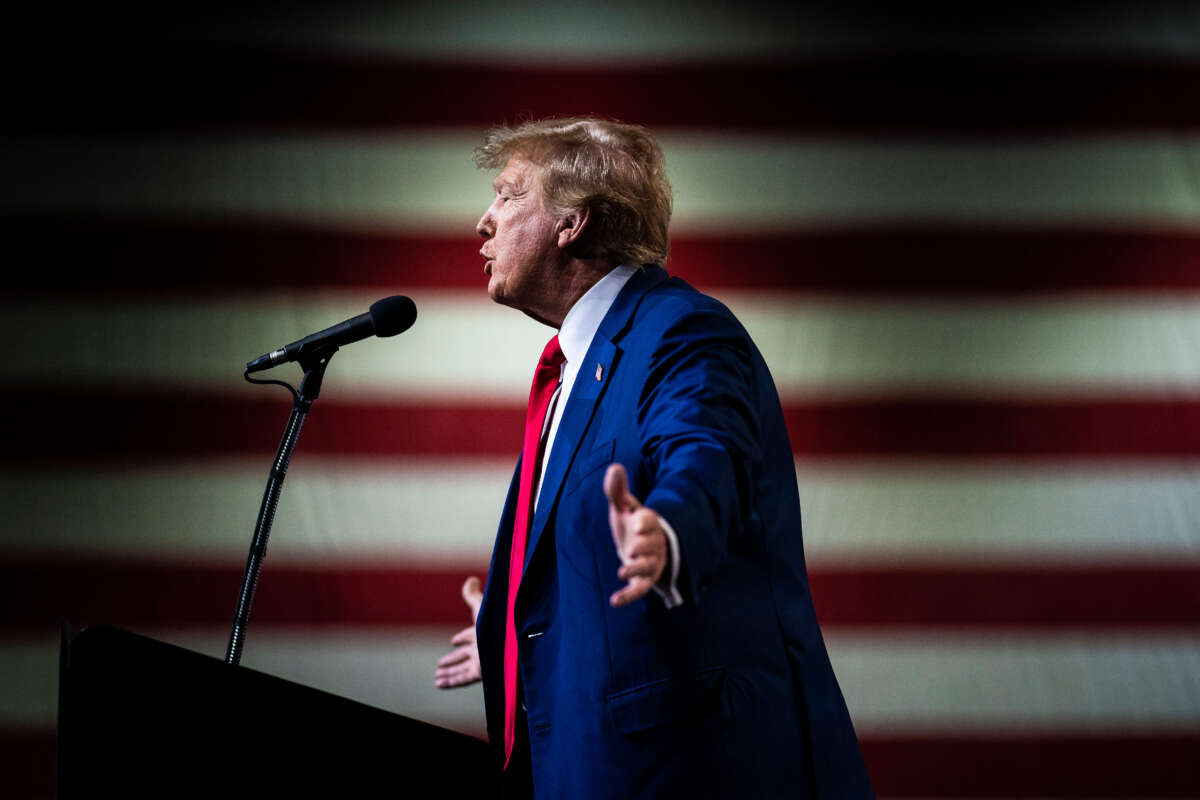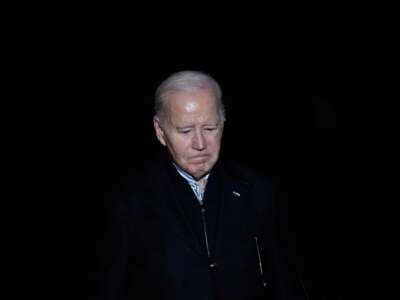The Heritage Foundation Is Preparing the Ground for Trumpism to Seize the State
The conservative think tank, which eschewed Trump and Trumpism in 2015, is now leading the Trump 2.0 campaign.
By Sasha Abramsky ,
December 28, 2023 Former President Donald Trump speaks during an event held at the Reno-Sparks convention center on December 17, 2023, in Reno, Nevada.
Former President Donald Trump speaks during an event held at the Reno-Sparks convention center on December 17, 2023, in Reno, Nevada.
 Former President Donald Trump speaks during an event held at the Reno-Sparks convention center on December 17, 2023, in Reno, Nevada.
Former President Donald Trump speaks during an event held at the Reno-Sparks convention center on December 17, 2023, in Reno, Nevada.JABIN BOTSFORD / THE WASHINGTON POST VIA GETTY IMAGES
In 2015, when Donald Trump entered the presidential fray, the Heritage Foundation critiqued him for favoring “Big Government” and not being nearly conservative enough. The D.C.-based think tank all but endorsed Sen. Ted Cruz in the primaries, and came out strongly against Trump’s tariff proposals.
A year later, however, it was serving as something of a gatekeeper for the Trump administration: in the months after Trump’s election win in 2016, the new president embraced many of Heritage’s ideas, and reached out to the organization for its staff and former-staff to fill roughly 70 key positions, both in the transitional team and in the administration. Edwin Feulner, co-founder of Heritage, worked as head of domestic policy for the Trump transition, and Larry Kudlow, who served as director of Trump’s National Economic Council was recommended via Heritage’s Project to Restore America.
Heritage might not have liked Trump’s persona, but its leadership concluded that behind the crass populist lay a politician who would bend to embrace their core policy goals, such as lower taxes for the wealthy and smaller government across all areas apart from military and security spending. He was, they may have reasoned, their useful idiot.
In 2015, when Donald Trump entered the presidential fray, the Heritage Foundation critiqued him for favoring “Big Government” and not being nearly conservative enough. The D.C.-based think tank all but endorsed Sen. Ted Cruz in the primaries, and came out strongly against Trump’s tariff proposals.
A year later, however, it was serving as something of a gatekeeper for the Trump administration: in the months after Trump’s election win in 2016, the new president embraced many of Heritage’s ideas, and reached out to the organization for its staff and former-staff to fill roughly 70 key positions, both in the transitional team and in the administration. Edwin Feulner, co-founder of Heritage, worked as head of domestic policy for the Trump transition, and Larry Kudlow, who served as director of Trump’s National Economic Council was recommended via Heritage’s Project to Restore America.
Heritage might not have liked Trump’s persona, but its leadership concluded that behind the crass populist lay a politician who would bend to embrace their core policy goals, such as lower taxes for the wealthy and smaller government across all areas apart from military and security spending. He was, they may have reasoned, their useful idiot.
Two presidential election cycles later, the power dynamic has shifted. Now it is Heritage looking to adapt its policy stances and reshape its ideological priorities to match Trump’s nativist, xenophobic, anti-free-trade instincts.
From Broadly Conservative to Narrowly Trumpist
The organization, set up in 1973 by Feulner and Paul Weyrich — two young congressional staffers who had come of political age during the Nixon years but who viewed his presidency as being too liberal — has long been a hard-charging go-to organization for conservative state and federal politicians looking for ideas to push and personnel to staff their offices. It was seeded with copious donations from beer magnate Joseph Coors, and has traditionally pushed low-tax, free market and militaristic policies, as well as anti-abortion legislation and the notion of rolling back many government social service functions. “The principles of America’s Founders must be restored to their proper role in the public and political discourse, influencing public policy and reforming government to reflect constitutional limits,” declares the front page of The Heritage Foundation’s website.
RELATED STORY

2023 Was a Bad Year for Joe Biden
Voters are still upset about inflation, but it’s the destruction of Gaza that could haunt Biden in 2024.
By Mike Ludwig , TRUTHOUT December 27, 2023
At least in its earlier incarnations, however, it wasn’t afraid to draw intellectual input from a wide array of public figures, including Daniel Patrick Moynihan (a well-known scholar on poverty and its causes, who served in the Johnson administration), and an eclectic mix of political figures ranging from the segregationist Jesse Helms to the more libertarian-minded Jack Kemp.
In the same way as the Republican Party in 2020 eschewed a specific policy platform in favor of simply putting its muscle behind whatever goals Trump favored, so today’s Heritage Foundation has become all about securing Trump’s power.
Yet, its image as a heterogenous ideas-incubator always sat uneasily with the rather odious, anti-democratic leanings of its original public face, Paul Weyrich. Weyrich, an Evangelical Christian, made no secret of his desire to make it harder for his opponents to participate politically, or of his wish to “Christianize” U.S. politics. His politics were uncompromising, and in many ways, he fashioned a hatred of moderate Republicans that, decades later, would be taken up by Trump and his acolytes’ sneering attacks on RINOs — Republicans In Name Only. He also pioneered the use of cultural wedge issues, and opposition to what he called “cultural Marxism” as a way of driving Evangelical voters to the polls.
In 1986, Heritage opposed the immigration reform that Ronald Reagan signed into law, which gave legal status to more than 2 million previously undocumented immigrants. Yet, despite policy differences with the Gipper, by and large, Reagan’s administration was supported by Heritage, with the organization providing vocal support for the Star Wars missile defense system and backing the movement to slash taxes for the wealthy.
These days, the Foundation, long the toast of conservative Washington, has reinvented itself as the primary ideas-engine for a Trump second term, performing a somewhat similar hard-right role to that of the Council for National Policy (of Gini Thomas notoriety) in bygone decades. It is, in its reincarnation, far from the ostensibly small-c conservatism of its earlier years. In the same way as the Republican Party in 2020 eschewed a specific policy platform in favor of simply putting its muscle behind whatever goals Trump favored, so today’s Heritage Foundation has become all about securing Trump’s power — no matter whether his signature policies are in line with those traditionally espoused by Heritage — and, once he has it, making the process easier for him to wield it.
To that end, Heritage is spearheading Project 2025, a multimillion-dollar effort, in alliance with dozens of other conservative groups, to generate a slew of hard-right ideas for Trump, ranging from locking down the southern U.S. border and securing it with military personnel, to using the Insurrection Act to pre-emptively neutralize domestic opposition to the extremist agenda that Trump has promised to realize.
For the last three years, the Heritage Foundation has been at the center of an effort to professionalize Trumpism
Central to this project is the goal of identifying thousands of loyalists to staff key administration positions and — if Trump reclassifies tens of thousands of civil service positions as political hires — entire branches of the civil service and regulatory agencies. The project’s aim is to have 20,000 potential hires in their database come the election — and to then run many of these individuals through its Presidential Administration Academy, where they will learn how to best navigate the federal system with the ultimate goal of capturing regulatory agencies for radical conservatives and breaking down, to use a term coined by Steve Bannon, the “Administrative State.”
It’s hard to overstate the significance of this effort. If Trump 1.0 was a fairly rudimentary, chaotic effort, with the demagogic real estate mogul entering the White House largely unprepared to use power effectively, Trump 2.0 would likely be a far different beast. After all, for the last three years, the Heritage Foundation has been at the center of an effort to professionalize Trumpism, to add a veneer of ruthless effectiveness to the noisy, chaos-strewing bluster. Project 2025 isn’t a fly-by-night effort; rather, it’s a coordinated legal, legislative and administrative campaign to allow the MAGA movement to gain control of all tiers of the federal system from day one of a new Trump administration.
In its mission statement, Heritage claims that it is “building an America where freedom, opportunity, prosperity, and civil society flourish.” It’s hard to square that noble sentiment with the organization’s no-holds-barred support for an insurrectionist former president — a demagogue who gins up violence against marginalized communities, attacks the free press and threatens to unleash the full might of the Justice Department, the IRS and other agencies against his opponents in the world of politics, the courts, law enforcement and the military.
SASHA ABRAMSKY is a freelance journalist and a part-time lecturer at the University of California at Davis. His work has appeared in numerous publications, including The Nation, The Atlantic Monthly, New York Magazine, The Village Voice and Rolling Stone. He also writes a weekly political column. Originally from England, with a bachelor’s in politics, philosophy and economics from Oxford University and a master’s degree from the Columbia University Graduate School of Journalism, he now lives in Sacramento, California.

No comments:
Post a Comment